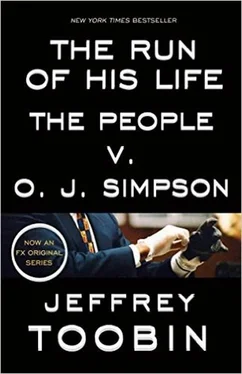
All the defense lawyers, of course, wanted to be the ones to travel to North Carolina to argue that the tapes should be turned over. Cochran would go-that much was settled. Shapiro wanted Gerry Uelman to handle the legal issues. Bailey said that Uelman was a nice guy but he always lost his arguments. Bailey wanted… Bailey to go. In the end, Cochran decided to take Bailey. Usually, in the many briefs the defense filed over the course of the case, a secretary in Cochran’s office signed the lawyers’ names. But in a bizarre measure of how seriously the defense team took the McKinny issue, all the lawyers insisted on signing their own names to the North Carolina brief. (It was thus especially ironic that the true authors of that brief, Bailey’s law partners in Boston, Ken Fishman and Dan Leonard, preferred to remain behind the scenes and did not have their names on it.)
So on Friday, July 28, Cochran and Bailey appeared before Judge William Z. Wood, Jr., in Forsyth County, North Carolina, to ask him to enforce the subpoena to McKinny. Since Ito, the trial judge in the case, had ruled that the material was relevant, Wood’s approval should have been just a formality. In his chambers, Judge Wood let Cochran see transcripts of the tapes for the first time. They were worse (and, thus, from Cochran’s perspective, better) than even he had imagined. Fuhrman used the crudest slurs imaginable, and “nigger” repeatedly. When McKinny took the stand in front of the North Carolina judge (and the waiting press corps), Cochran couldn’t wait to work a few quotes from the tapes into his questions. For example, Cochran asked McKinny, “Did Detective Fuhrman say to you during this first interview, when you were getting his attitude-quote-that ‘we’ve got females and dumb niggers and all your Mexicans that can’t even write the name of the car they drive. And you think I’m kidding? We have people who aren’t even citizens on the department.’ Did he say that to you?” McKinny said he did.
Yet Judge Wood-unaccountably-ruled against Cochran and Bailey, asserting that the tapes were not material to the Simpson defense case. This was a shattering blow, and Bailey immediately set his law partners in Boston to work on an emergency appeal. But as devastated as Cochran was by the ruling, he knew he had accomplished something important in getting at least a few of Fuhrman’s words out via the North Carolina court hearing. The public quickly became more interested in the Fuhrman-tapes sideshow to the Simpson spectacle, especially since the trial itself had degenerated into a droning series of defense experts. In light of the growing public obsession with the tapes, Cochran changed his approach to the Simpson case. For the final month of the case, Johnnie Cochran would campaign for acquittal not just in the courtroom but in the country at large-and not just as a lawyer, but as a self-appointed civil rights leader.

After an extraordinary effort by Bailey’s law partners, the North Carolina Court of Appeals overturned Judge Wood’s plainly incorrect ruling on August 7. The McKinny tapes arrived at last in Cochran’s office on August 9. Media interest in their contents grew even more fevered.
The loss in North Carolina, even though it was later rectified, rattled Cochran. Confident from the beginning that he could win a hung jury for his client, Cochran felt the tapes represented the ammunition he needed to push the jurors toward an outright acquittal. At the most basic level, of course, the tapes proved that Fuhrman had lied in answering Bailey’s carefully phrased questions about whether the detective had used the word “nigger” in the previous ten years. But more than that, the tapes allowed Cochran to make Fuhrman’s irrefutable bigotry stand as a proxy for the racism of the LAPD as a whole. The choice in the case would come down to exactly the one Darden had predicted seven months earlier in his original debate with Cochran over what became known in the trial as the “n-word”: “Whose side are you on?… Either you are with the Man or you are with the Brothers.”
But Cochran couldn’t trust that Ito wouldn’t, like Judge Wood, thwart him at the last moment. Like most of the lawyers on both sides, Cochran assumed that some news about the trial was filtering back to the sequestered jurors. He also thought that general public agitation about the tapes fed the prosecution’s insecurity and growing sense of panic. All in all, then, Cochran needed a public airing of the tapes. In other words, he needed their contents leaked to the press.
The prosecutors, for their part, could tell what Cochran was thinking, and they tried to counter his strategy. If they could confine the McKinny controversy and limit public exposure of the tapes, they had a chance of preventing the case from evolving into a referendum on police racism. Therefore, the prosecutors were only too happy when Schwartz, McKinny’s attorney, insisted before Ito that the tapes be governed by a tightly worded protective order. (Schwartz still entertained hopes of selling them.) On August 10, Ito directed that the audiotapes should “remain under seal” until he ordered otherwise. Ito’s order permitted only the lawyers on the case and their direct assistants access to the tapes and the transcripts. Ito’s order built a wall of secrecy around the tapes-until or unless the judge himself ordered them to be played in court.
In light of the protective order, Cochran couldn’t simply hand the transcripts over to a friendly reporter. Same with the other defense lawyers-the risk of exposure was simply too great. The question thus became who on the defense team could do it. Who wouldn’t mind taking the chance of directly violating a court order? Who had contacts among the reporters on the press corps? Whose ethics permitted him to do a job like that? All signs pointed to one man:
Larry Schiller.
O.J. Simpson’s literary amanuensis, the coauthor of I Want to Tell You , had spent the entire trial ingratiating himself with reporters as well as gathering material from inside the defense camp for his next, still inchoate, ghostwritten version of Simpson’s story. Schiller loved being at the center of the action, so he was only too happy to share the McKinny largesse with his journalist friends, and they were likewise pleased with their scoops. For the next week or so, Schiller leaked hate-filled tidbits to reporters. (Schiller denies doing this.) The ensuing outcry from the public against Fuhrman added immeasurably to the pressure on Ito to admit the tapes into evidence, just as Cochran knew it would.

When lawyers from both sides finally sat down to listen to the tapes, they were struck by something besides Fuhrman’s bigotry. Everyone also noticed the references to Margaret York, who was Fuhrman’s onetime commander in the West Los Angeles division and Lance Ito’s wife. York had been one of the early female recruits to the LAPD (and, in true Los Angeles fashion, a model for the television series Cagney and Lacey ). In keeping with his role in McKinny’s project, Fuhrman had excoriated women police officers in general but also, it turned out, York in particular. Among other things, Fuhrman said on the tape that the judge’s wife had “sucked and fucked her way to the top.”
The lawyers brought this to Ito’s attention in chambers on August 14. The issue was further clouded by the fact that earlier in the case, York had filed a declaration in the Simpson trial saying that she remembered little about Fuhrman except that he was once one of the officers under her command. As Cochran put it gently to Ito, “This is a very delicate issue… It is going to have to do with credibility, because you know, her declaration-this guy, unless he is absolutely lying-and Marcia will back me up on this-the contacts he has with Lieutenant York are the kind that are very hard to forget him.” In other words, as some lawyers on both sides came to believe, York may have lied in her sworn statement that she didn’t remember Fuhrman.
Читать дальше















